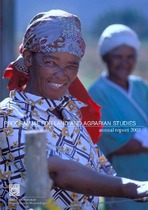| dc.contributor.author | PLAAS | |
| dc.date.accessioned | 2019-03-07T11:13:32Z | |
| dc.date.available | 2019-03-07T11:13:32Z | |
| dc.date.issued | 2004 | |
| dc.identifier.citation | PLAAS, 2004. Annual report 2003. Cape Town: Institute for Poverty Land and Agrarian Studies (PLAAS). | en_US |
| dc.identifier.uri | http://hdl.handle.net/10566/4406 | |
| dc.description.abstract | Applied social science researchers generally want to see their
research influence policy and practice; those of a more activist
bent seek to ‘change the world, not simply to interpret it’.1
In its
mission statement PLAAS envisages a strong connection between
its research projects and processes of policy development
and advocacy. To this end we are guided by clear values and a
commitment to ‘social change that empowers the poor, builds
democracy and enhances sustainable development… gender
equity is integral to these goals’ (PLAAS mission statement).
It is relatively easy to reach agreement on a general statement
of this kind, but applying and realising this vision is less
straightforward. The macro- and micro-politics of policy making
and programme implementation are complicated and often highly
contested. In addition, PLAAS researchers do not always agree
with one other on the content of policy recommendations or on
strategies of engagement. They do, however, seek to learn from
each other through discussion and debate on a rich and varied
range of experiences. | en_US |
| dc.language.iso | en | en_US |
| dc.publisher | Institute for Poverty Land and Agrarian Studies (PLAAS) | en_US |
| dc.relation.ispartofseries | Annual report;2003 | |
| dc.subject | Annual report | en_US |
| dc.subject | PLAAS | en_US |
| dc.title | Annual report 2003 | en_US |
| dc.type | Book | en_US |

